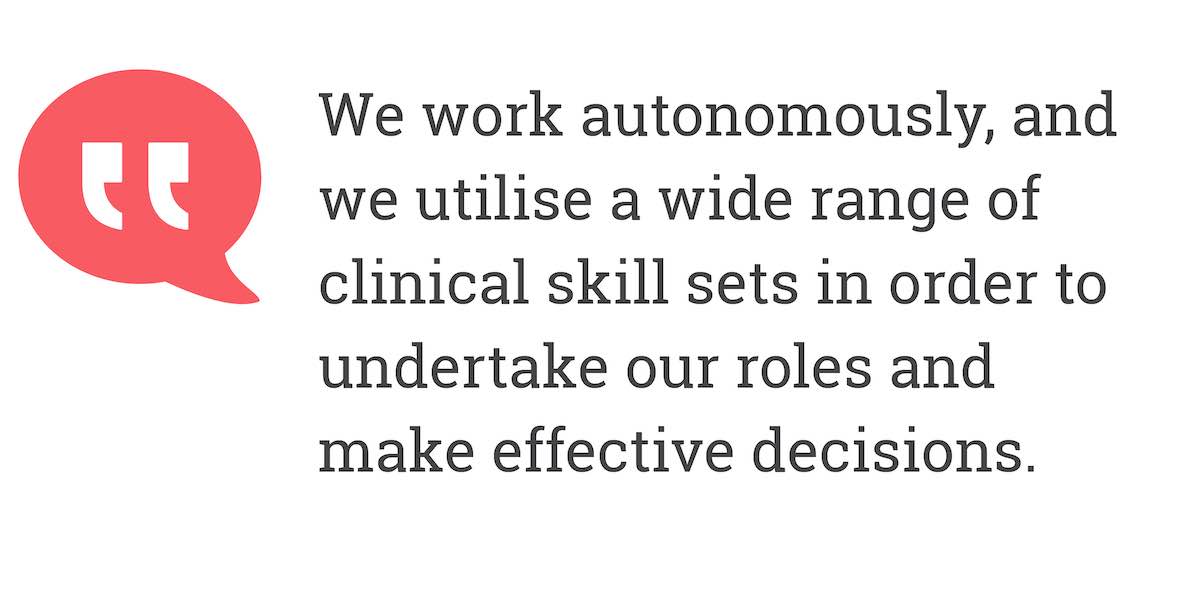- 07 May 2020
- 16 min read
Why I think you should become an Occupational Health Nurse
Subscribe "I am a true believer in remaining on the “front line” with your team to fully understand what is happening at ground level."
"I am a true believer in remaining on the “front line” with your team to fully understand what is happening at ground level."Specialist Practitioner, Tracie McKelvie, is passionate about her job as an Occupational Health Nurse. She explains why she loves it, and offers a full guide to how you can do what she does.
Topics covered in this article
How I became an Occupational Health Nurse
The role of an Occupational Health Nurse / Advisor
What qualifications and skills do you need to pursue a career in Occupational Health?
What are the Challenges in Occupational Health?
How I became an Occupational Health Nurse
I have been nursing for over 30 years, having started my career as a “care assistant” in 1989.
I started my “formal” nursing career pathway as a trainee SEN, also known as RN2 in 1991, and took this route because I did not have the qualifications for direct entry onto the RGN course.
While successfully completing my SEN training, I also attended night school to get the relevant qualifications that I needed and a few years later, I converted to RGN, (RN1) via degree route.
I class myself as a good example of having worked my way up from the bottom rung of the career ladder, and with my passion, hard work and determination to succeed, I have gradually progressed up that ladder to be where I want to be today.
Over the years, I have had the opportunity to develop a wide range of skills having gained a vast amount of exposure to a variety of settings throughout the UK, and the Isle of Man.
I have worked within the NHS, public and private sectors, and have witnessed first-hand how some health detriments can significantly affect our quality of life, and potentially our livelihood.
Health promotion and health education has always been a passion of mine, but not just for my patients, their families and carers; but for myself and my colleagues too.
I have always felt strongly that in order to do a great job, to be happy in your job, and to be the best that you can be, our own physical and psychological wellbeing is paramount.
I naturally promoted this, often taking the lead on health and wellbeing initiatives in the workplace, making sure that I was able to gain relevant knowledge and access further development, whether this be self-funded, or through the NHS, and when an opportunity arose to enter into Occupational Health Nursing in 2002, I jumped at it.
That was 18 years ago and although it has taken a lot of self-discipline and further structured formal learning, to include my Specialist Practitioner Degree in Occupational Health Nursing with the Robert Gordon University to get where I am today, it has been an incredibly worthwhile journey; I haven’t looked back.
I now hold a managerial position within Occupational Health and I have more of an opportunity to influence change.
I have a voice both within my organisation, and within the wider public health arena.
I have been extremely lucky to have been further supported in gaining enhanced management training, successfully completing an Executive Nurse Leadership Course which was fully supported by the Queens Nursing Institute.









About this contributor
Occupational Health Nurse Manager – Specialist Practitioner
I’ve been nursing for over 30 years and having achieved status as a SEN, an RGN, an Occupational Health Specialist Practitioner, and a Queens Nurse. I’m as passionate about my work now as I was when I began. Nursing is a significant part of who I am and what I believe in. I was awarded the Queens Nurse Title in 2018, which further embedded my values. I act with compassion, empathy, respect, honesty and integrity, and I am incredibly proud to be a part of this unique and respected profession.
More by this contributorWant to get involved in the discussion?
Log In Subscribe to commentJosephine Green
Josephine Green
3 years agoHi Tracie, I really enjoyed this read thank you! What do you think about the new proposed changes by the NMC ... read more
Hi Tracie, I really enjoyed this read thank you! What do you think about the new proposed changes by the NMC to change the current standards required for SCPHN and instead introduce a generic community SPQ? Potentially scrapping the current registration on the 3rd part of the register?
read less
Hi Josephine, Thanks for your feedback. Regarding the changes, I am delighted that the SCPHN will continue to be annotated as a registerable / recordable qualification - with both core AND specific ... read more
Hi Josephine, Thanks for your feedback. Regarding the changes, I am delighted that the SCPHN will continue to be annotated as a registerable / recordable qualification - with both core AND specific standards being a requirement, and updated. Re the SPQ's, I am very concerned, as are many others in that the NMC have overlooked the importance of specific standards for each specialist area, and in respect of the "community specialist practitioner" SPQ, there is no annotation at all. This in my view potentially compromises our patients and the public. As nurses, we need to stand together and have our voices heard, so it is so important that we respond to the NMC consultation in this regard. :)
read less